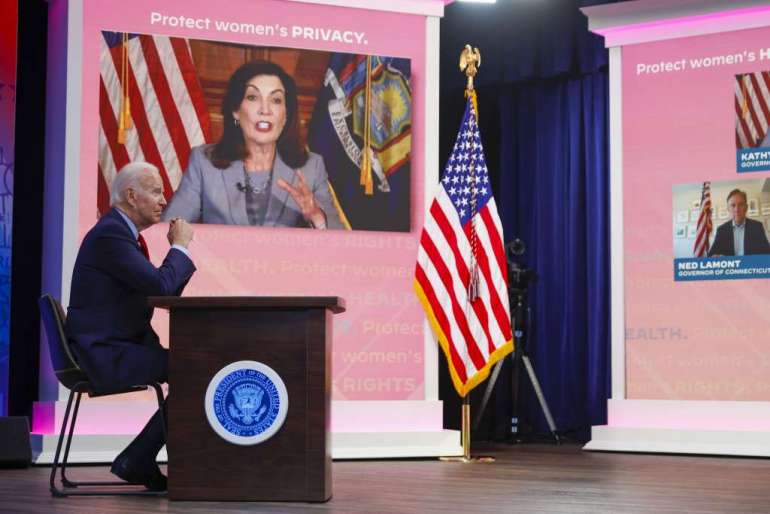As abortion access shrinks, eyes are on Biden. Where we stand 11 days after Roe fell.

Here’s more of this week’s news you may have missed on abortion in America:
CONGRESS
Biden calls for carveout in filibuster to codify Roe
During a press conference last week, President Joe Biden voiced his support for codifying Roe v. Wade into law, marking his most concrete call for legislative action to federally protect abortion. Because Democrats lack the votes to overcome the filibuster, the president suggested a carveout for abortion rights.
“If the filibuster gets in the way, it’s like voting rights, it should be ‘we provide an exception for this’ — require an exception to the filibuster for this action to deal with the Supreme Court decision,” Biden said, repeatedly urging voters to elect Democrats in November.
However, obstacles still stand in Democrats’ way. While Sen. Joe Manchin (D-W.Va.) expressed his support for codifying Roe into law, both he and Sen. Kyrsten Sinema (D-Ariz.) have not committed to the idea of changing Senate rules to protect abortion rights. Even if Democrats gain the two seats needed to potentially secure enough votes to amend the filibuster, the carveout would prove futile if Republicans take control of the House in November.
Read more: Biden says he supports a filibuster carveout to restore abortion rights
POLITICS
Progressives urge Biden to take more action, use executive powers
While Biden committed to codifying Roe, progressives want more executive action.
In the past week, members of Congress and state legislators have proposed that the executive branch could declare a public health emergency, use federal lands to set up abortion clinics in states where it’s outlawed, expand access to abortion medication and ensure people in the military can receive abortions regardless of location.
“Time for people to see a real, forceful push for it,” Rep. Alexandria Ocasio-Cortez (D-N.Y.) tweeted following Biden’s filibuster comments. “Use the bully pulpit. We need more.”
Biden has promised additional action, but he has emphasized that people heading to the polls during the midterms, and electing Democrats to codify Roe, is the only way to “truly” protect abortion rights. For now, the president has committed to protecting people who travel to other states to obtain an abortion while he pushes for legislative action.
Read more: Democratic exasperation builds at Biden’s slow roll on Roe
POLICY
Battle over trigger laws rages in several states
Since Roe’s overturning, a handful of conservative states have moved fast to implement trigger laws — legislation designed to immediately ban abortions statewide. But some have faced significant pushback, setting up legal battles in the states’ courts.
In Florida, a state circuit court judge struck a blow to Gov. Ron DeSantis’ assault on abortion protections, ruling to temporarily block a new law that would prohibit all abortions in the state after 15 weeks of pregnancy — providing no exceptions for victims of rape, incest or human trafficking. DeSantis vowed to appeal the decision. Similar struggles are playing out in Oklahoma, Louisiana, Utah and Kentucky.
Laws banning the medical procedure have gone into effect in at least four states, including Arkansas, Missouri, South Dakota and Wisconsin. Last week, the Mississippi attorney general certified the state’s trigger law. Per state law, the ban will go into effect within 10 days of the certification.
“This entire court battle was never about winning a court case; it was always about creating a culture of life, and that’s exactly what we are doing here in Mississippi,” said Republican Gov. Tate Reeves on “Fox News Sunday.”
States including Texas, North Dakota, Wyoming, Idaho and Tennessee have trigger laws that will go into effect 30 days after the Court’s decision to overturn Roe, or once state officials certify the bans.
Read more: Mississippi’s governor: Full speed ahead with new abortion restrictions
TECHNOLOGY
Google says it will delete location data after abortion cybersecurity concerns
In the wake of cybersecurity concerns for people seeking abortions, Google announced Friday it would soon delete location logs of people who visit abortion clinics.
Immediately following POLITICO’s publication of the court’s draft opinion overturning the right to an abortion, Google searches for abortion medications spiked, especially in states that were likely to restrict the procedure.
The tech giant said it plans to roll out a feature allowing users to delete multiple entries of period tracking data at once from the Fitbit and Google Fit apps.
Abortion rights advocates on social media have suggested people delete period tracking apps all together. But removing Clue from a home screen might not be a sufficient cybersecurity solution, and similar apps have actually gained users since Roe was overturned, according to reporting from the New York Times.
Read more: Google says it will delete users’ location history at abortion clinics, other ‘personal’ data
SCOTUS
Court’s chief security officer: Get off their lawns
The Supreme Court’s top security officer told Maryland and Virginia officials on Friday to put an end to protests outside of justices’ homes.
Marshal of the Court Gail Curley wrote to Maryland Gov. Larry Hogan and Virginia Gov. Glenn Youngkin, both Republicans, asking them to enforce state statutes banning picketing outside of private homes.
“For weeks on end, large groups of protesters chanting slogans, using bullhorns, and banging drums have picketed justices’ homes in Maryland,” Curley wrote in his letter to Hogan.
Hogan and Youngkin asked the Justice Department in May to help protect the court’s justices. In response to Curley’s letter, a spokesperson for Hogan said the governor had urged the Justice Department to act under “clear and unambiguous” federal statute, and that the constitutionality of the state statute in question was under review. The spokesperson added that Hogan has directed state police to further review enforcement options.